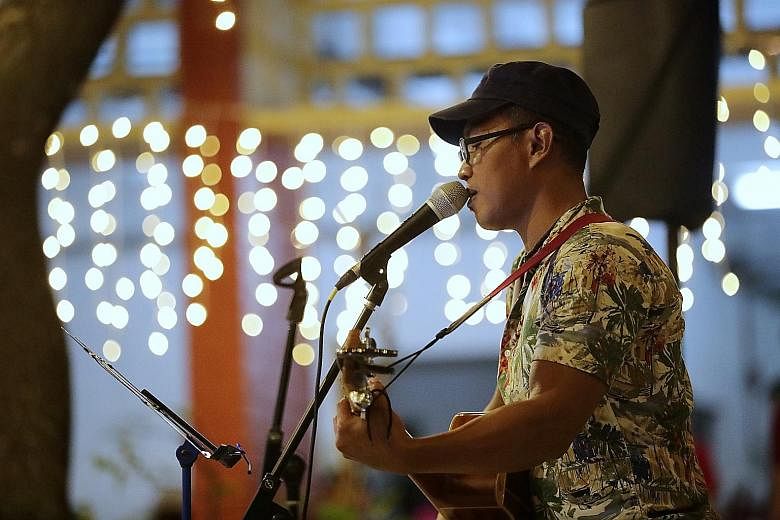While families gathered for reunion dinner on the eve of Chinese New Year last year, May, who declined to give her full name, spent a lonely evening tucking into chicken rice bought from a coffee shop.
After falling out with her younger brother about a decade ago, the 41-year-old moved out of her HDB flat in Whampoa and began sleeping in the streets, wandering around various haunts in Bugis and the city area.
"It was very stressful. Every day, you had to think about where to eat, where to sleep, where to go to shower," she told The Straits Times.
But May, who is unemployed, has more reason to celebrate this year.
Volunteers from the Homeless Hearts of Singapore who befriended her three years ago encouraged her to move back home.
While she has not fully patched things up with her brother, she now has a roof over her head.
Yesterday, May marked Chinese New Year with 250 other rough sleepers at Transit Point @ Margaret Drive, an interim shelter for the homeless. There, they tucked into a steamboat meal and tossed yusheng for prosperity and good fortune.
It was the first such event of its kind organised by the Partners Engaging and Empowering Rough Sleepers (Peers) network, launched last July to bring together the Ministry of Social and Family Development (MSF) and 25 other government agencies and community partners who help the homeless.
It includes groups such as Catholic Welfare Services and Homeless Hearts of Singapore, whose volunteers have walked the streets and befriended rough sleepers in Singapore for years.
Under the Peers network, officers from agencies like the MSF and the Housing Board (HDB) also join community groups on such night walks, which can give them a better understanding of issues faced by the homeless and how best to help them.
"Many said walking the ground with us was an eye-opening experience," said Mr Abraham Yeo, co-founder of the Homeless Hearts of Singapore.
In the past, for instance, officers from the social service offices might not have understood why some homeless people do not submit important documents required to apply for help.
It can be easy to write them off and think they are out to cheat the officers, Mr Yeo said. "But when they speak to them on the ground, they will realise that the documents may have been stolen while they were on the move."
This paves the way for more empathy and understanding.
The homeless may also be wary of government officers. But with community partners as trusted intermediaries, more could be convinced to seek help from various government agencies in matters such as housing or social assistance.
With the agencies now on board, it has also become easier for rough sleepers to resolve housing issues, said Mr Yeo.
Peers network has engaged 160 rough sleepers and helped 65 of them find long-term housing since it was set up. Another 37 have been moved to interim accommodation.
MSF and its community partners have also collaborated to open overnight community-based shelters for those who are not ready to seek help from government agencies or be referred to MSF-funded transitional shelters or welfare homes.
Minister for Social and Family Development Desmond Lee, who was guest of honour at the dinner last night, thanked the Peers network for working with MSF as "equal partners". "This is the way in Singapore that we can work together to solve difficult problems," he said.
Mr Marcus Moo, director of social and community services at The Salvation Army, said there are many other areas of future collaboration for the Peers network, like providing health services to the homeless.
Another attendee at the dinner, who wanted to be known only as Leo, 42, said that he has been able to secure financial assistance with the help of Peers network.
He was homeless for a few months after being released from prison for drug offences last year, and is currently staying at a shelter for men in crisis. He also performed a few songs at last night's dinner.
"Because I don't have any savings, I can't find a permanent place to live in. But I hope to pursue my passion for music and make a living through what I do one day, and help and inspire others in the process."
Correction note: An earlier version of this story said that MSF has engaged 160 rough sleepers since Peers was set up. This was a collective effort by the Peers network. The name of the interim shelter at Margaret Drive has also been updated for clarity.


